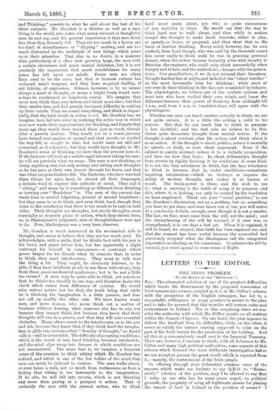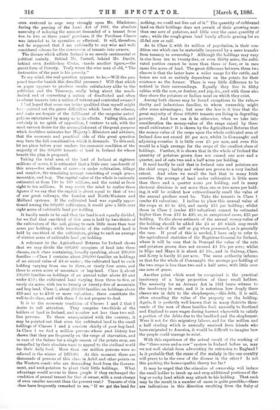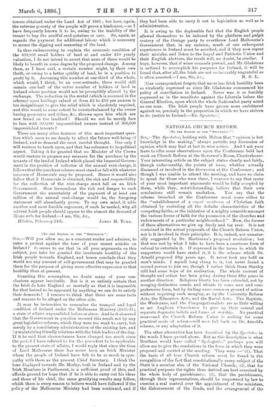LETTERS TO THE EDITOR.
THE IRISH PROBLEM.
[TO THE EDITOR OF THE •• SPECTITOR.1 SIR,—The attempted solution of one of the greatest difficulties which besets the Government by the proposed conversion of Irish tenants into owners, coupled as it is in Mr. Giffen's scheme with the protection of the English ratepayer, has led to a remarkable willingness in many quarters to assent to the plan and to take for granted that this transfer will restore order and contentment to Ireland. Nor is this surprising when we con- sider the authority with which Mr. Giffen speaks on all matters within the domain of figures. On one hand, the plan appears to deliver the landlord from his difficulties, while, on the other, it seems to satisfy the intense craving supposed to exist on the part of the Irish tenant for the possession of his bolding. And all this at a comparatively small cost to the Imperial Treasury. There are, however, I venture to think, with all deference to Mr. Giffen and many high political authorities, some aspects of this scheme which demand the most deliberate investigation before we can accept as proven the great result which is expected from it,—namely, the contentment of the Irish people.
In offering through your influential columns some of the reasons which make me hesitate to say Q.E.D. to " Eoono- mist's " solution of the problem, may I be allowed to say that I write as one who has for some years urged, on political grounds, the propriety of using all legitimate means for placing the tenant of land in Ireland in the position of owner ? I even ventured to urge very strongly upon Mr. Gladstone, during the passing of the Land Act of 1881, the absolute necessity of reducing the amount demanded of a tenant from five to two or three years' purchase, if the Purchase Clause was intended to be operative or effectual. It will, therefore, not be supposed that I am unfriendly to any wise and well. considered scheme for the conversion of tenants into owners.
The disease which afflicts Ireland is no merely sentimental or political malady. Behind Mr. Parnell, behind Mr. Devitt, behind even Archbishop Croke, stands another figure,—the gaunt form of Poverty. Truly wrote the wise man of old, "The destruction of the poor is his poverty."
To my mind, the real question appears to be,—Will the pro- posed transfer banish this dreadful presence P Will that which on paper appears to produce results satisfactory alike to the politician and the Treasury, really bring about the much- desired end of converting a nation of disaffected and often insolvent tenants into a nation of solvent and contented owners?
I bad hoped that some one better qualified than myself might have pointed out the grave difficulties which beset the scheme, and make me despair of the fulfilment of the sanguine antici pations entertained by many as to its effects. Failing this, and certainly in no spirit of opposition, I venture to ask, with the most earnest desire for the accomplishment of the great purpose which doubtless animates her Majesty's Ministers and advisers, that the economic and practical side of this great question may have the full consideration which it demands. To this end, let me place before your readers the economic condition of the majority of the 600,000 tenants of land in Ireland for whose benefit the plan is proposed.
Taking the total area of the land of Ireland at eighteen millions of acres, it is estimated that a little over one-fourth of this area—five millions of acres—is under cultivation, tillage and meadow, the remaining acreage consisting of rough grass, mountain, and bog. The capital value of the whole is variously estimated at from 140 to 160 millions, and the rental at from eight to ten millions. It may assist the mind to realise these figures if we say that the capital is about equal to that of two of our great railways, the London and North-Western and Midland systems. If the cultivated land was equally appor- tioned among the 600,000 cultivators, it would give a little over eight acres of cultivable land per holding.
It hardly needs to be said that the land is not equally divided, for we find that one-third of this area is held by two-thirds of the cultivators of the soil, giving to each little more than four acres per holding ; while two-thirds of the cultivated land is held by one-third of the cultivators, giving to each an average of sixteen acres of cultivable land per holding.
A reference to the Agricultural Returns for Ireland shows that we may divide the 600,000 occupiers of land into three classes, each class containing, broadly speaking, about 200,000 families :—Class 1 contains about 200,000 families on holdings of an annual value of £4 or under ; the cultivated land to each holding varying from one to three, or rarely four acres, and three to seven acres of mountain or bog-land. Class 2, about 200,000 families on holdings of an annual value above £4 and under £10; the cultivated land varying from three to five, or rarely six acres, with ten to twenty or twenty-five of mountain and bog-land. Class 3, about 200,000 families on holdings above £10 and up to £100 or more valuation ; these constitute the well-to-do class, and with them I do not propose to deal.
it is to the economic condition of Classes 1 and 2 that I desire to call attention. They comprise two-thirds of the holders of land in Ireland, and number not less than two mil- lion persons. To those unacquainted with the country, it may be pointed out that even the cultivated land in the small holdings of Classes 1 and 2 consists chiefly of poor bog-land. In Class 1 we find a million persons whose past history has shown that they are frequently on the verge of starvation, and in ease of the failure for a single season of the potato crop, are compelled by their absolute want to appeal to the civilised world for their daily food. More than one million persons were so relieved in the winter of 1879-80. At this moment there are thousands of persons of this class in Achil and other points on the Western coasts who are demanding food from the Govern- ment, and seed-potatoes to plant their little holdings. What advantage would accrue to these people if they exchanged the condition of annual tenant for that of owner, with a rent-charge of even smaller amount than the present rent ? Tenants of this class have frequently remarked to me, "If we got the land for
nothing, we could not live out of it." The quantity of cultivated land on their holdings does not permit of their growing more than one acre of potatoes, and little over the same quantity of oats ; while the rough-grass land barely affords grazing for an ill-fed cow or calf.
As to Class 2, with its million of population, is their con- dition one which can be materially improved by a mere transfer from tenancy to ownership? Although the holdings may vary in size from ten to twenty-five, or even thirty acres, the culti- vated portion cannot be more than three or four, or in rare cases five acres of land. The great difference between these two classes is that the latter have a wider range for the cattle, and hence are not so entirely dependent on the potato for their existence as the former. There is very little difference to be noticed in their surroundings. Equally they live in filthy cabins with the cow, or donkey, and pig, &c., and with these also they share the potatoes or Indian meal on which they exist.
Among both classes may be found exceptions to the rule,— thrifty and industrious families, to whom ownership might offer some advantages ; but none the less is it true that the great majority of these 400,000 tenants are living in degrading poverty. And how can it be otherwise, when we take into consideration the money-value of the crops raised by these small cultivators ? It is shown by the Agricultural Returns that the money-value of the crops upon the whole cultivated area of Ireland does not exceed £6 per acre, whilst in Connaught and adjoining counties it is little over 25 per acre, and even this would be a high average for the crops of the smallest class of holdings. Further, it is shown that in the whole of Ireland the quantity of potatoes grown does not exceed one acre and a quarter, and of oats two and a half acres per holding.
It need hardly be said that in Ireland oats and potatoes are the chief crops; barley and wheat are grown to a very limited extent. And when we recall the fact that in many Irish counties the average of land under cultivation is little more than three and a quarter acres per holding, and in many electoral divisions is not more than one or two acres per hold- ing, it will be evident how extraordinarily small the value of the annual produce must be. Take the tenants in Class 1 (under £4 valuation). I incline to place this annual value of the crops at £6 to £10, and rarely £15 per holding; whilst those in Class 2 (under £10 valuation) cannot be estimated higher than from £12 to £20, or, in exceptional cases, 225 per holding. To the above estimate of the annual money-value of the holding should be added the £t or £6 which may result from the sale of the calf or pig when possessed, as is generally the case. If proof of this is needed, I have only to refer to the agricultural statistics of the Registrar-General for Ireland, where it will be seen that in Donegal the value of the oats and potatoes grown does not exceeed £4 10s. per acre; whilst in Sligo and Mayo it is about £3 10s., and in Galway, Clare, and Kerry is barely £5 per acre. The same authority informs us that for the whole of Connaught the average per holding of the two crops is less than two and a half acres, with little over one acre of grass.
Another point which must be recognised is the practical insolvency of a large proportion of these small holders. The necessity for an Arrears Act in 1881 bears witness to the insolvency in rent; and it is notorious how deeply these classes are in debt to the shopkeepers,—this debt, it is said, often exceeding the value of the property on the holding. Again, it is perfectly well known that in many districts thou- sands of the men of these families flock annually to Scotland and England to earn wages during harvest wherewith to satisfy a portion of the debts due to the landlord and the shopkeeper. Were it not for this migratory labour, and for the million and a half sterling which is annually received from friends who have emigrated to America, it would be difficult to imagine how the people could manage to exist.
With this experience of the actual result of the working of the " three-acres-and-a-cow " system in Ireland before us, may we not well shrink from advocating its extension to England P Is it probable that the cause of the malady in the one country will prove to be the cure of the disease in the other P Is not this pushing the homoeopathic theory too far ?
It may be urged that the stimulus of ownership will induce the small holder to break up and crop additional portions of the bog or rocky land which may attach to his holding. That such may be the result in a number of cases is quite possible,—there are indications in this direction resulting from the fixity of tenure obtained under the Land Act of 1881; but here, again, the extreme poverty of the people will prove a hindrance,—as I have frequently known it to be, owing to the inability of the tenant to buy the needful seed-potatoes or oats. So, again, as regards the payment for additional labour which is necessary to secure the digging and manuring of the land.
In thus endeavouring to explain the economic condition of the 400,000 small holders of land at and under £10 yearly valuation, I do not intend to assert that none of these would be likely to benefit in some degree by the proposed change. Among them, as I have said, a certain number might, by their own thrift, or owing to a better quhlity of land, be in a position to profit by it. Assuming this number at one-third of the whole, which would, I think, be an over-estimate, there would still remain one-half of the entire number of holders of land in Ireland whose position would not be perceptibly altered by the exchange. The reduetion in the rental (which is assumed in the scheme) upon holdings valued at from £2 to £10 per annum is too insignificant to give the relief which is absolutely required, and this would to some extent be counterbalanced by the owner having poor-rates and tithes, do., thrown upon him which are now levied on the landlord ! Should we not be merely face to face with 300,000 impoverished owners instead of 300,000 impoverished tenants ?
There are many other features of this most important ques- tion which seem to me deeply to affect the future well-being of Ireland, and to demand the most careful thought. One only I will venture to touch upon, and that has reference to its political aspect. Taking it for granted that no Minister of the Crown would venture to propose any measure for the purchase by the tenants of the land of Ireland which placed the Imperial Govern- ment in the position of collector of the annual rent-charge, it follows that the purchase scheme must stand or fall with whatever measure of Home-rule may be proposed. Hence it would also follow that if Home-rule is obtained, the risk and responsibility for the collection of the rent charge must fall on an Irish Government. How tremendous the risk and danger to such Government the uncertainty of the payment of at least one million of the annual rent-charge would be, the foregoing statement will abundantly prove. To my own mind, it adds another and most forcible argument, if such be needed, why all solvent Irish people should oppose to the utmost the demand of Home-rule for Ireland.—I am, Sir, &c.,




































 Previous page
Previous page